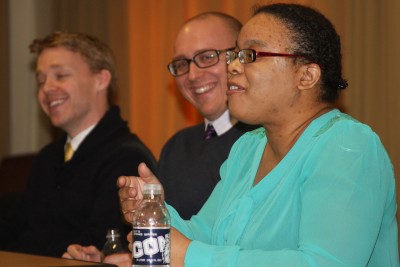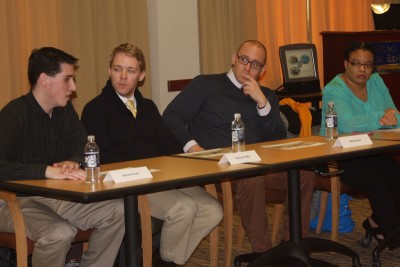
The Higher Education and Student Affairs (HESA) program’s first alumni feedback panel meeting this past February was a successful effort to enhance program offerings. Alumni from a community college, a regional public university, and a technical college were invited to share their views of what elements of the current HESA program were useful and what aspects could be tweaked to strengthen the relevance to contemporary practice.
The HESA program prepares graduate students to become college administrators around the country. Students who graduate, work in a variety of roles that can include anything from career services to residential life to programs that enhance academic success. The HESA program is highly competitive. Within the last year 290 students applied for only 20 available spots. Each student must complete two 10-hour/week internships, plus 20 or more hours/week at an assistantship position within a student services office at the University of Connecticut. These intensive practical experiences foster the application of theories to complex challenges of practice.
Even though students get extensive opportunities for supervised practice while still enrolled, the program seeks to help its graduates make a seamless transition to professional administrative work. Therefore the leaders of the HESA program decided to seek feedback from newer professionals who work at institutions very different from UConn. At the panel, four alumni of the program came to UConn to talk about their experience and to give suggestions to current HESA faculty and the UConn professionals who supervise internships.
The four alumni agreed that HESA provided them with many invaluable experiences that helped with their transition to the real world. Patrick Duffy (’09), the internship coordinator and academic advisor at Westchester Community College said that the structure of the program, having conversations with his advisor, and his expectations with the assistantship settled his nerves and made him more comfortable about his professional job. Students in the HESA cohort were also seen as important to the educational process.
“Every student was ambitious and driven,” said Rachel Jones (‘10), the academic advisor of the Gateway to College Program at Springfield Technical College. “You will not find a group of students as driven. A lot of these students are willing to bend over backwards to get their jobs done.”
Jones also suggested a more extensive focus on budget. Because of the changes in the fiscal landscape within higher education, budget management is a more critical skill now than it was just three or four years ago. “Provide students with experiences with budget,” she said. “It’s really important and it makes or breaks your program.”
Jones discussed different ways to incorporate budget learning into the program by allowing students to get some practice before graduating.
Duffy added that a focus on the political side of the budget should be included, going over justification behind why certain budget decisions could be made. Another helpful suggestion raised during the discussion was to teach HESA students how to collaborate with the faculty members employed at their institutions.

Adam Frank (’09), the student involvement director at Westchester Community College, shared his lack of experience when dealing with faculty. Frank admitted to facing challenges when trying to incorporate faculty into his programs at Westchester. Frank explained how he was unsure how to handle the faculty culture when he first began, even though he had a strong desire to bring faculty in as partners with co-curricular student involvement initiatives.
Billy Dunn (’08), the assistant director for Residential Education at Westfield State University, also noted having difficulty starting conversations with professors since he didn’t know the particulars of the faculty culture or incentives. Dunn suggested that students in the program should learn how to start building connections with faculty, which will help them when they move into their careers. “It could be as simple as having a student watch as you work with faculty,” Dunn told the attendees.
Dr. Sue Saunders, extension professor in Neag School of Education’s Department of Educational Leadership and coordinator of the HESA program, was pleased with the outcome of the panel discussion. Saunders stated that the four alumni identified useful ways to capitalize on program strengths and to add new emphases that will continue to make the program relevant. Saunders hopes to continue with more discussions to create the vital link between alums and students in the HESA program.
“The alums are very invested in the program and always ask me for ways they can contribute to the program,” says Saunders. “The faculty and internship supervisors don’t have a chance to dialogue with the alums outside of UConn staff otherwise.”
Saunders and other HESA program leaders plan to include alumni in more intentional ways with more panel discussion and as consultants to students‘ class projects. More alumni involvement will help students learn how their work at UConn can be translated into the field, says Saunders. Saunders sees discussions such as this one becoming a tradition within the program.
 Facebook
Facebook
 Twitter
Twitter
 LinkedIn
LinkedIn
